Virginia City
The story of Virginia City begins in 1859 with the discovery of gold in nearby Six-mile Canyon. Prospectors Pat McLaughlin and Peter O'Reilly found it, but when Henry Comstock claimed that he owned the land they believed him and the find became known as the Comstock Lode. Silver was discovered soon after and Virginia City was born. So big were the finds here that Abraham Lincoln rushed through early statehood for Nevada in order to support the cost of the Civil War. At its peak Virginia City was home to nearly 30,000 people. The good times ended in 1898 when the Comstock Lode ran out and the city went into sharp decline. The decline left Virginia City with a bewildering array of historic buildings. It is now a National Historic Landmark and a major tourist attraction.
Pipers Opera House, North B Street
In this picture, Pipers Opera House is on the left and to the right is a block containing the Knights of Pythias and E Clampus Vitus buildings plus the Miner’s Union Hall. The Opera House was built in 1885 to replace one that burned down in 1883. Almost every type of entertainment was staged here from the popular stars of the era through circus acts to Shakespeare and Opera. Although the Miner’s Union Hall dates from the 1870s, an Miner’s Union activities date right back to 1863. Click Tab 2 to see more of the E Clampus Vitus Building & Miner’s Union Hall
Storey County Court House, B Street
Although it has fewer interesting old buildings than C Street, B Street carries little traffic so it is much easier to appreciate the history. Dating back to 1876, the court house was built to replace one that burned down the previous year. Over the door is a life sized figure of ‘Justice’ which, unusually for the USA, does not have a blindfold.
Derelict building & MacKay Mansion
Here we have the two sides of Virginia City, a rotting building next to a beautifully preserved mansion from the boom years. The mansion was built in 1859 as the home and offices of mining superintendent George Hearst who soon made his money and left. The mansion is named after Irish immigrant John Mackay who lived there from the early 1870s and made a fortune from the Comstock Lode when many thought it had passed its peak. The MacKay Mansion is open for tours throughout the year.
Former bar and hardware store, South C Street
There are so few modern buildings in downtown Virginia City that you can image that you are back in the gold rush era. Well, you could but for the traffic, as this is a National Historic Landmark with a serious traffic problem. Traffic is carried through the city on C Street and that is where everyone wants to park. Old buildings line C Street, but heavy traffic makes it impossible to get a good view of them. What Virginia City is crying out for is a bypass and its streets handed back to pedestrians. Here the former Crystal Bar stands next to the former John Gillig Hardware Store. Most of the shops in this area are now aimed solely at tourists.
Click on Minimap to navigate
DLU250113
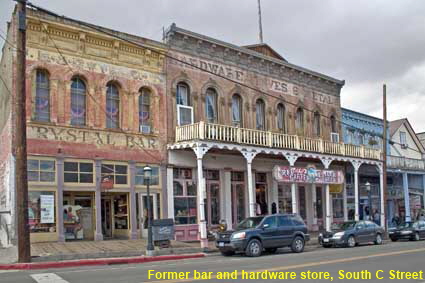
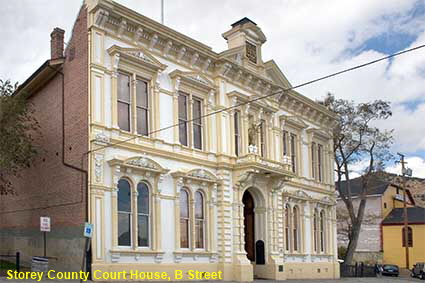
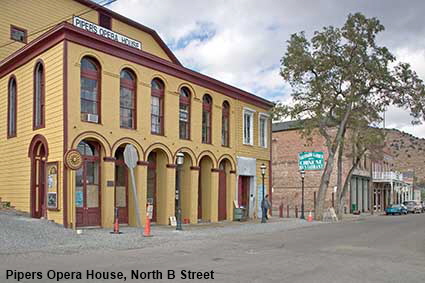
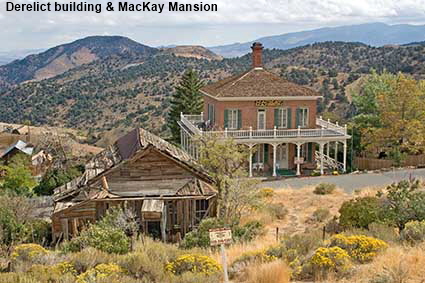
Virginia & Truckee Railroad at Virginia City
In 1868 the Central Pacific Railroad reached the Truckee Meadows at Lake's Crossing (now Reno). The Virginia & Truckee Railroad was built between 1869 and 1873 to connect the city to the Central Pacific. It ran south from Reno to Carson City then branched south to Minden and east through mountainous terrain to Virginia City. It followed a route full of twists, turns and tunnels. The fortunes of the V&T rose and fell with the those of the city. In 1941 the tracks to Virginia City were removed and the remainder of the line closed in 1950. The track between Carson City and Virginia City has been rebuilt and in season there is a full day excursion along the 19km (12 mile) route from Carson City to Virginia City. For those who find a whole day trip on the Virgina & Truckee a little too long here is also a 35 minute round trip from Virginia City to Gold Hill.
St Mary’s Catholic & St Paul’s Episcopal Churches
Fire was one of the biggest dangers for the boom towns and cities of the west. St. Mary’s in the Mountains Catholic Church (on the left) dates back to 1877 but three previous Catholic churches in the city were all destroyed by fire. The last fire, in 1875, also destroyed St. Paul’s Episcopal church and it was rebuilt in 1876. While St. Mary’s was rebuilt in brick to make it less vulnerable to fire, St. Paul’s was rebuilt using native pine held together with wooden pegs.
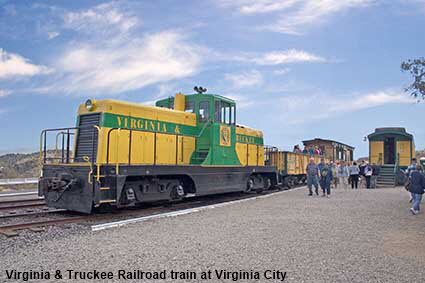
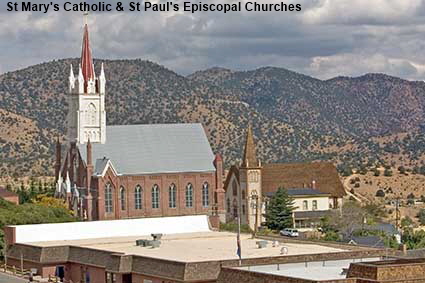


To move forwards or backwards through the Nevada trail click the arrows above, or select your next destination on the Minimap.


© Mike Elsden 1981 - 2025
The contents of this page may not be reproduced in full or in part without permission